Key takeaways
- Ethical dilemmas challenge individuals to confront conflicting values, highlighting the complexity of moral choices where there are no clear right or wrong answers.
- John Rawls’ theory emphasizes fairness and equality in justice, encouraging empathy by imagining decisions made without personal bias.
- Applying Rawls’ principles shifts focus from personal gains to prioritizing the well-being of the least advantaged, fostering a more just approach to ethical decision-making.
- Engaging in ethical analysis promotes self-reflection and deepens empathy, allowing for more nuanced understanding of different perspectives and fairness in complex situations.
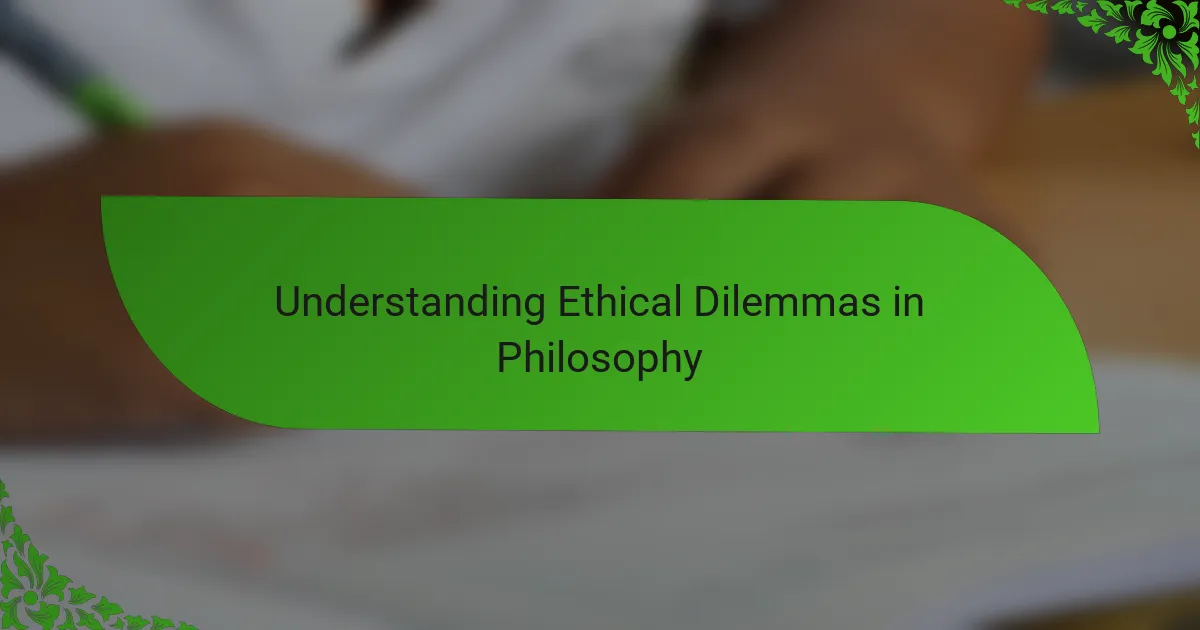
Understanding Ethical Dilemmas in Philosophy
Ethical dilemmas have always fascinated me because they force us to confront situations where there is no clear right or wrong answer. When faced with such dilemmas, I find myself questioning what values I hold most dear. Have you ever struggled to decide between two equally important principles? That internal conflict is precisely what makes ethical dilemmas so compelling in philosophy.
In my experience, understanding ethical dilemmas requires more than just knowing moral rules—it demands empathy and reflection. Philosophers ask us to step into others’ shoes and imagine the consequences of our choices, which often reveals hidden tensions and challenges. This process can be uncomfortable but ultimately rewarding, as it deepens our moral awareness and sharpens our critical thinking.
What’s striking to me is how ethical dilemmas reveal the complexity of human life and morality. They remind us that ethical decisions are rarely black and white; instead, they exist in shades of gray where careful reasoning and emotional insight must work together. Isn’t it fascinating how philosophy pushes us to embrace this uncertainty rather than shy away from it?
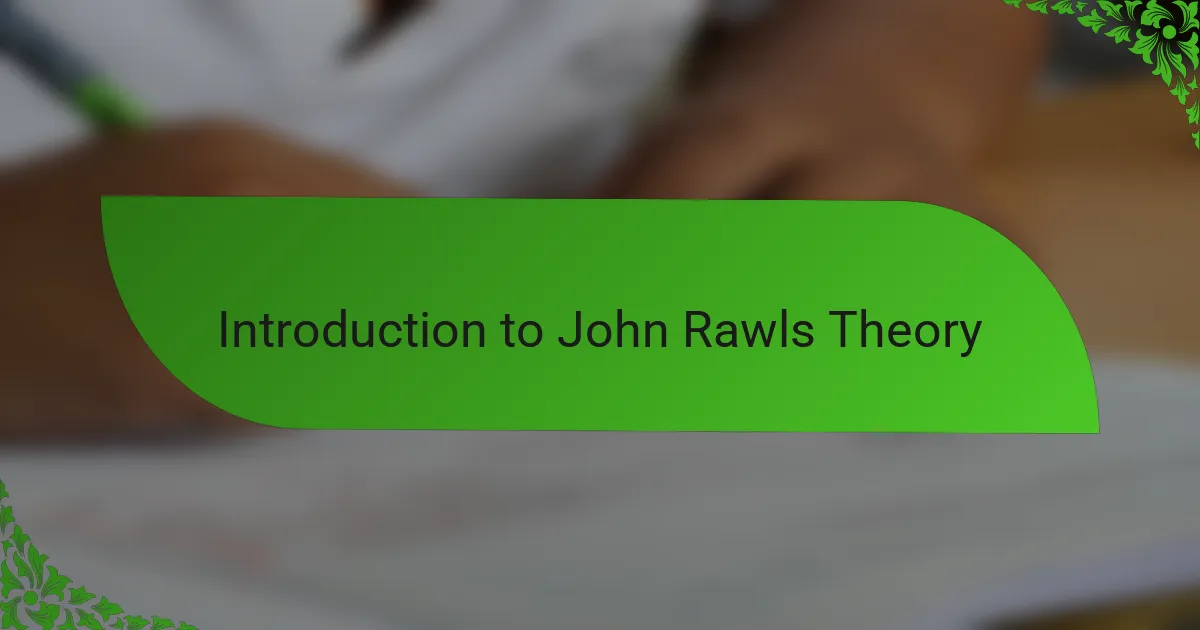
Introduction to John Rawls Theory
John Rawls’ theory immediately caught my attention because it tries to bring fairness into moral and political decision-making. His concept of the “original position,” where people choose principles of justice behind a “veil of ignorance,” really made me reflect on how bias affects our judgments. I remember thinking, what if I didn’t know my own social status or abilities—how would I want society to be structured?
What struck me most is how Rawls emphasizes equality and fairness as foundations for justice, rather than simply maximizing overall happiness or benefits. This felt different from other ethical theories I had encountered, prompting me to reconsider what fairness truly means in complex situations. Have you ever paused to question whether rules should be fair to everyone equally or just benefit the majority?
Rawls’ approach invites real empathy by encouraging us to imagine ourselves as any member of society, not just from our own perspective. I found this idea powerful because it challenges us to think beyond our personal gain and consider the well-being of the least advantaged. It’s almost like stepping outside yourself and viewing the world through a shared human lens—something I think we could all practice more.
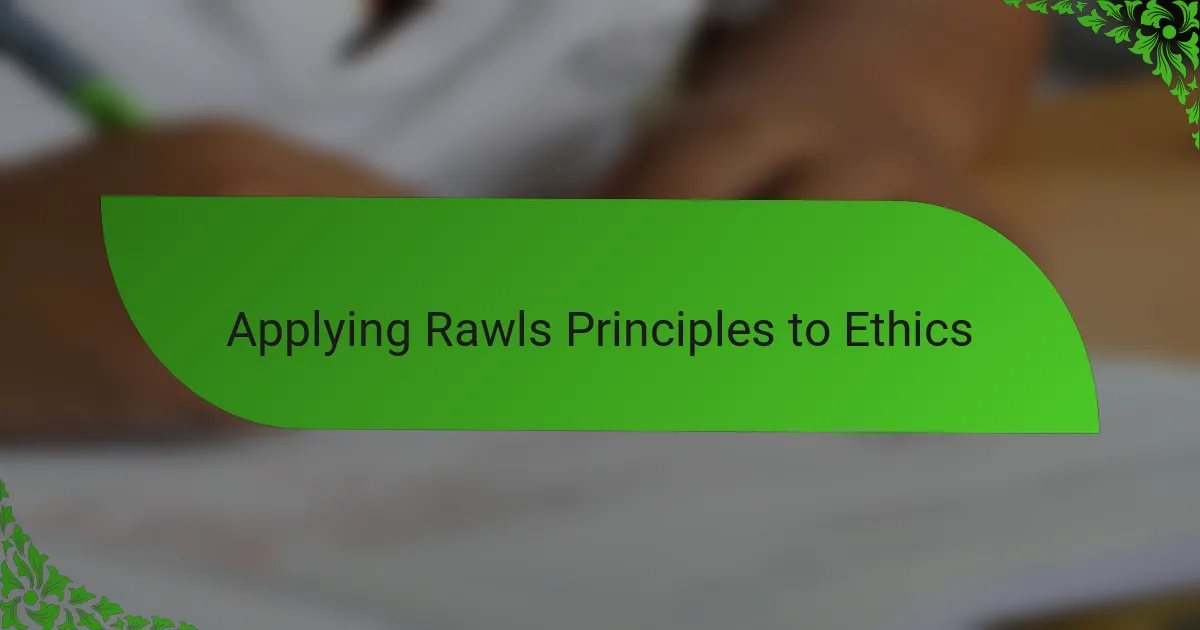
Applying Rawls Principles to Ethics
Applying Rawls’ principles to ethics feels like putting on a new pair of glasses that sharpen how I see justice in everyday choices. When I consider the veil of ignorance, I ask myself: What ethical rules would I support if I had no clue about my own position in life? This thought experiment often leads me to favor fairness that protects the most vulnerable, rather than rules that simply benefit those already advantaged.
In real-life dilemmas, Rawls’ emphasis on equality pushes me to pause and think beyond my immediate interests. I remember wrestling with a tough decision at work involving resource distribution—applying Rawls helped me focus on fairness, not just efficiency. Isn’t it remarkable how this perspective shifts our priorities from winning for ourselves to creating just outcomes for everyone?
What resonates most with me is how Rawls challenges us to balance empathy with rational fairness. It’s not just about feeling for others but designing principles that everyone would agree to, no matter who they are. Have you tried this mindset? I find it both humbling and empowering, like crafting ethical solutions that hold up under the strictest scrutiny yet come from a deeply human place.
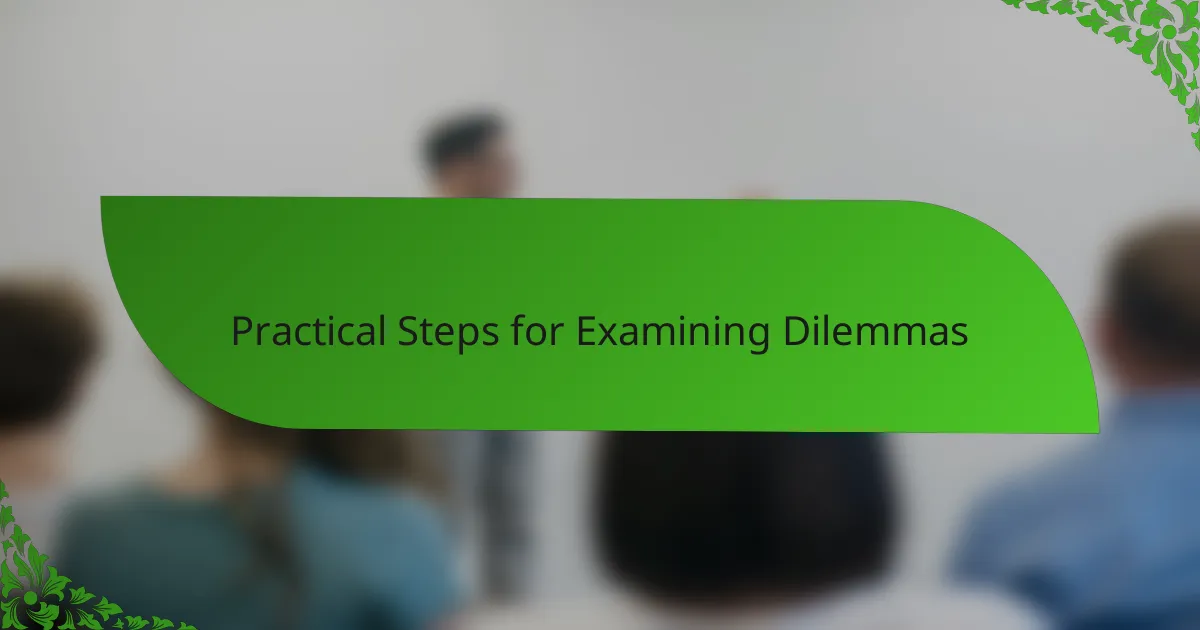
Practical Steps for Examining Dilemmas
When I start examining an ethical dilemma, the first step I take is to clearly identify the conflicting values at play. It helps me to write them down side by side, which makes the tension between them more visible. Have you noticed how just naming the values can bring some clarity to the messiness of moral conflict?
Next, I imagine myself behind Rawls’ veil of ignorance—removing any personal bias by pretending I have no idea who I am or where I stand in society. This exercise forces me to think about what fair principles would look like if I didn’t know my own advantage or disadvantage. I find this step vital; it cools down emotional reactions and brings rational fairness into focus.
Finally, I weigh the possible consequences while constantly asking, “Does this choice protect the least advantaged?” I recall a time when this question shifted my stance in a dilemma at work, steering me toward fairness rather than convenience. This practical commitment to justice, inspired by Rawls, makes ethical reasoning feel less abstract and far more grounded.
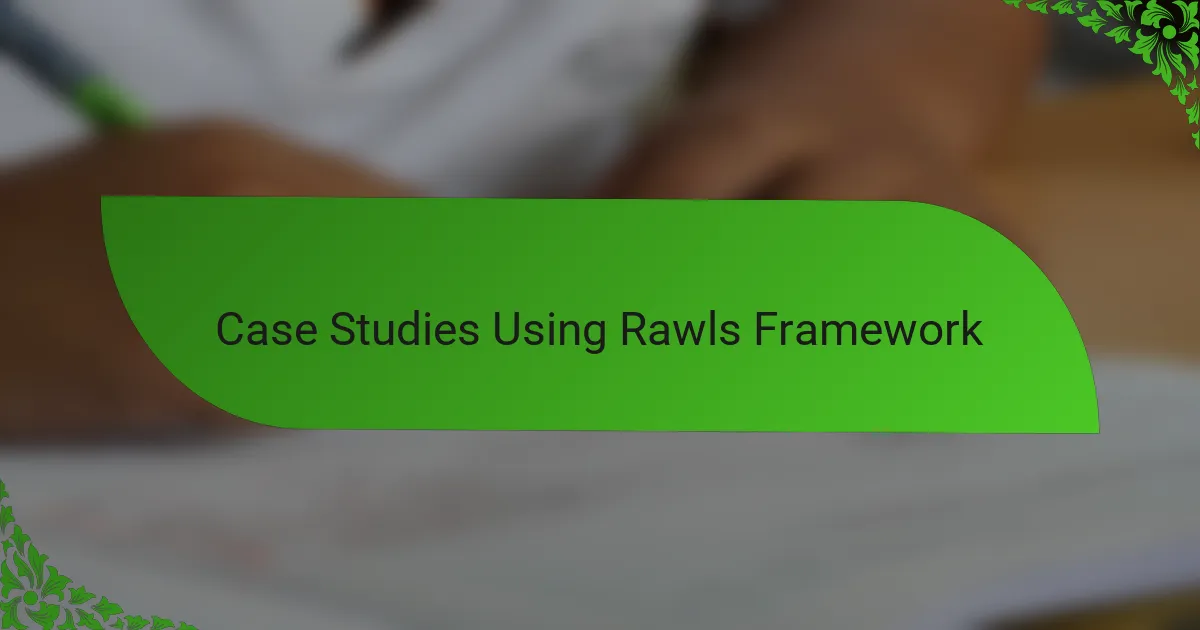
Case Studies Using Rawls Framework
One case study I explored involved healthcare allocation, where I had to decide how to distribute limited resources fairly. Using Rawls’ framework, I imagined being behind the veil of ignorance, not knowing whether I’d be a patient in need or a healthcare provider. This shift in perspective made me prioritize policies that protect the most vulnerable, even if it meant sacrificing some efficiency.
Another example came from a workplace scenario involving promotion criteria. Initially, I leaned toward rewarding the most productive employees, but Rawls’ emphasis on fairness pushed me to consider how systemic disadvantages might affect opportunity. Could I justify a system that ignores those starting from a less privileged position? Surprisingly, Rawls’ theory made me advocate for more inclusive criteria that balance merit with equity.
What struck me across these cases is how Rawls’ approach consistently challenged my gut reactions. Have you ever found yourself stuck between what seems practical and what feels just? I did, and applying Rawls’ principles helped me move beyond instinct to reasoned fairness—something that’s easier said than done but deeply rewarding.
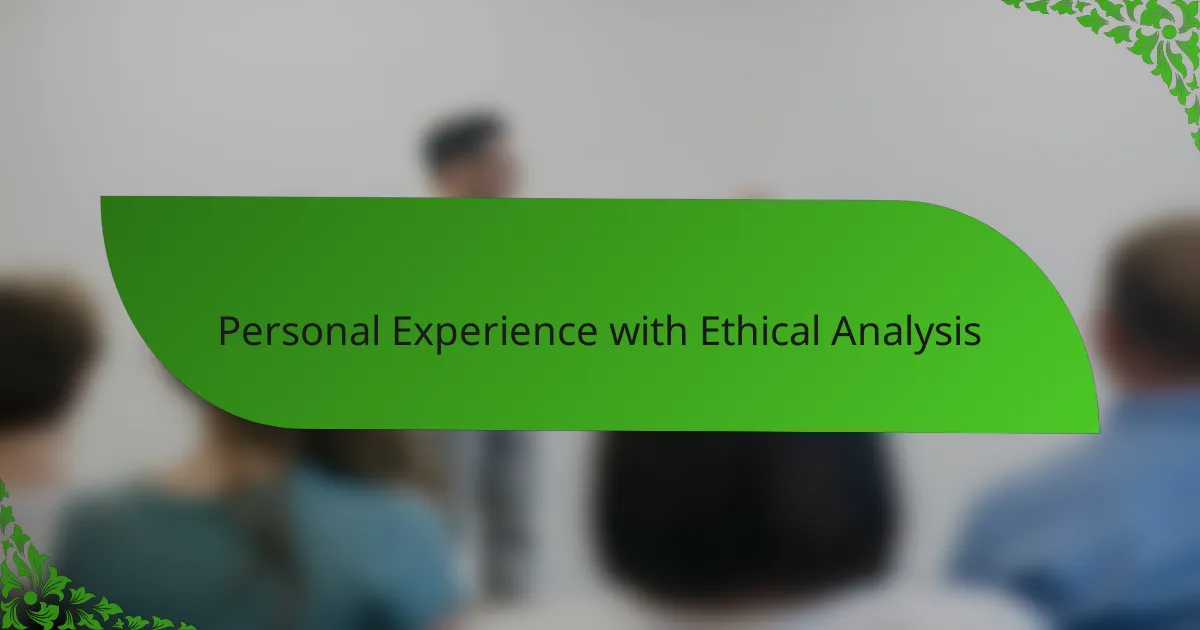
Personal Experience with Ethical Analysis
There was a moment early on when I realized that analyzing ethical dilemmas wasn’t just an intellectual exercise—it stirred something deeper inside me. I remember feeling a mix of discomfort and curiosity as I faced choices that challenged my own values. Have you ever felt that tension between what feels right emotionally and what makes sense logically? That’s where the real growth happens in ethical analysis.
I often found myself revisiting a dilemma multiple times, each round peeling back new layers of consideration. Sometimes it meant wrestling with my biases or confronting uncomfortable truths about fairness. What surprised me most was how this reflective process made me more patient and humble, recognizing that ethical clarity rarely comes quickly or easily.
One particular experience stands out: I was grappling with a community issue where my initial instinct favored one side, but ethical reasoning encouraged me to step back and broaden my view. It wasn’t easy, but adopting this stance deepened my respect for different perspectives. Do you find that ethical analysis sometimes feels like a dialogue with yourself, testing your boundaries and expanding your empathy? That’s exactly what happened for me.
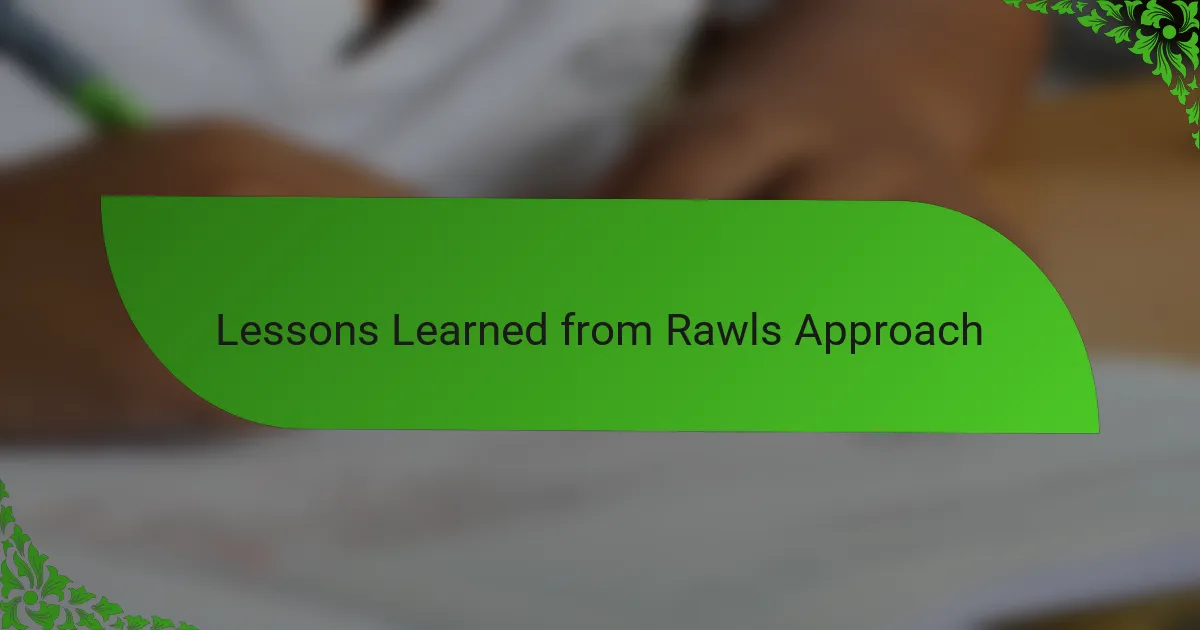
Lessons Learned from Rawls Approach
Rawls’ approach taught me that fairness isn’t just an abstract ideal—it’s a practical guide for living ethically. When I learned to imagine decisions made without knowledge of my own status, I realized how easily bias colors our judgments. Have you ever considered how different your choices might be if you truly had no idea where you’d end up in society?
One lesson that stuck with me profoundly is the importance of prioritizing the least advantaged. It’s tempting to focus on efficiency or majority benefit, but Rawls challenges us to care deeply about those often overlooked. I remember wrestling with this in a team project—shifting my view from “what’s best for us” to “what’s fair for everyone” changed the whole dynamic.
Finally, Rawls’ method showed me that ethical dilemmas aren’t puzzles to solve with quick fixes but opportunities to expand empathy and reason together. Have you noticed how this balance between feeling and thinking creates a richer understanding? For me, embracing this tension has made ethical reflection both humbling and empowering.